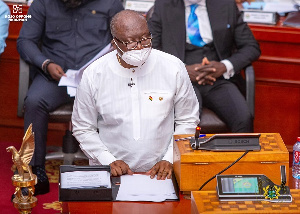 The E-levy has become one of the most controversial aspects of the 2022 budget
The E-levy has become one of the most controversial aspects of the 2022 budget
Members of Parliament received a number of proposals from tax experts on the issue of the now controversial Electronic transactions levy (E-levy) that Finance Minister Ken Ofori-Atta included in the 2022 budget.
Whereas one expert asked for the total scrapping of the tax, another hailed it as ingenious with a conditionality but two others asked that it be tweaked.
Majority Leader Osei Kyei-Mensah-Bonsu revealed in an interview on the November 27, 2021, edition of Joy FM’s News File programme that Parliament had however not agreed on any particular recommendation to the best of his knowledge.
He told the programme host that he also did not know whether Finance Minister Ken Ofori-Atta had any concessions on the E-levy when he prayed Parliament to allow him to consult further with members of the house before the passage of the budget last Friday.
What the Majority Leader said:
“During post-budget deliberations, we had many consultants who came to talk to us. One of them I would admit called for the total scrapping of the E-levy and for government to look elsewhere.
“One other said he thought that was a very ingenious thing to do so he felt that we should do it but that we need to further engage before its imposition.
“One person said, starting off at 1.75 was at the high side and that government could climb down and he proposed that we could start at 1%.
“Another said the weight was burdensome and that we should go to 1.50% and rather bring back the road tolls to top up. So all these discussions had gone on, how was the Minister going to respond other than engaging the caucus.
“And we felt if space had been granted things could have been sorted out,” he added.
Budget rejected, Majority reject ‘rejection’
A one-sided House (the Minority Caucus en bloc) on Friday, November 26, voted to reject the 2022 Budget presented before the house by Finance Minister Ken Ofori-Atta on November 17.
The Majority Group had earlier walked out of the House after a disagreement with the Speaker on his order to have all non-MPs to leave the floor of the house for a crucial voice vote.
The vote in question was to determine whether a request by the Finance Minister for Parliament to give him time to consult with leadership of the house on aspects of the budget before the approval vote is held.
Bagbin later allowed the 137 Minority MPs to vote on the Minister’s prayer, which was rejected before they also voted en bloc to reject the 2022 budget as presented by Ofori-Atta.
The Majority in a later press conference accused the Speaker of engaging in unconstitutionality vowing to right the wrong that the Speaker and the Minority committed when the House reconvenes coming Tuesday.
What Ofori-Atta said about 1.75% levy on electronic transactions
Ken Ofori-Atta introduced a new 1.75% levy on all electronic transactions such as Mobile money transactions, remittances and other electronic transactions.
Fees and charges of government services have also been increased by 15%.
The Finance Minister explained, “It is becoming clear there exists an enormous potential to increase tax revenues by bringing into the tax bracket, transactions that could be best defined as being undertaken in the informal economy.
“As such government is charging an applicable rate of 1.75% on all electronic transactions covering mobile money payments, bank transfers, merchant payments, and inward remittances, which shall be borne by the sender except inward remittances, which will be borne by the recipient.
“To safeguard efforts being made to enhance financial inclusion and protect the vulnerable, all transactions that add up to GH¢100 or less per day, which is approximately ¢3000 per month, will be exempt from this levy,” Ofori-Atta revealed.